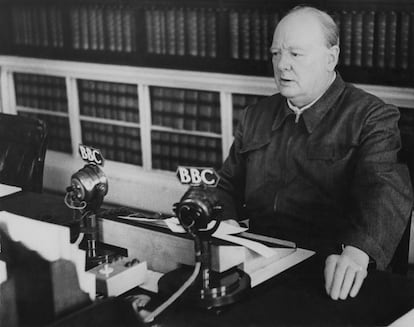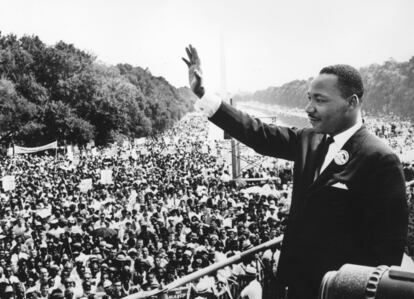Thirteen of history’s most famous speeches: from Jesus and Mandela, to Hitler, Putin and Zelenskiy
In his latest book, philologist Javier Alonso López curates and comments on 13 especially famous discourses and their staging

Volodymyr Zelenskiy, the president of Ukraine, is a great communicator, and his gift for exciting people with his speeches from the heart of war, without fleeing or abandoning his people, has shaped him into a hero in the eyes of his country and audiences and governments around the world. “He knows how to manage communication on social media with quick, synthetic videos, staging, war clothes, and a message that has made his people adore him: ‘I am us,’ he’s there to say,” explains Javier Alonso López, philologist, historian and biblical scholar. He just published an essay that, without premeditation on his part, seems to have come at exactly the right time: Discursos históricos (or, Historic Speeches, published by Arzalia Ediciones), in which he goes over 13 arguments from famous people who, using only their words, were able to change the conduct of their contemporaries, spurring them to war or resistence, thus bringing out their best or worst. The book spans Jesus’s Sermon on the Mount to Nelson Mandela’s speech upon being freed after 27 years of incarceration, and includes Abraham Lincoln, Mark Antony, Mahatma Gandhi and Adolf Hitler.
“Zelenskiy is a communicative animal: it’s clear that he’s won the media war,” continues Alonso López. It’s not for nothing that before serving as a politician and hero he was an actor and comedian. On the other side is his nemesis Vladimir Putin, president of Russia, who seems more similar to a movie supervillain. And not only due to his actions, some of which US President Joe Biden has characterized as “war crimes.” It’s also because of his mannerisms. “His speeches are long and lead-heavy, very much in the tradition of the great communist parties,” says Alonso. “It’s very clear where he comes from and that, contrary to Zelenskiy, he doesn’t feel very comfortable in this media war, which he knows that he’s lost.” His distant and perhaps deified figure is staged at the mile-long tables at which he sits the European leaders who visit him. The opposite of a leader in a khaki shirt waiting for the bombs to fall and making epic videos for social media.

Excitement for the masses
The greatest sentences of great speeches become the inheritance of the masses the same way that great verses do; in both cases they are repeated without knowing the author, because they’re owned in part by everyone. “I have a dream,” said Martin Luther King, Jr., standing up for the rights of Black Americans. “Ask not what your country can do for you – ask what you can do for your country,” emphasized John F. Kennedy at his inauguration. “Blood, toil, tears and sweat,” summarized Winston Churchill, to drum up resistance to Nazism. These are sentences that have become universal and out of time.
What is the fundamental element of a great speech? “More than anything, feeling,” responds Alonso. It’s said that we live in an age in which feeling predominates over reason, and that this has negative consequences for politics; however, for this expert, in the realm of speechmaking this ingredient has always been the fundamental core to move and mobilize listeners. “With one person it’s possible to sustain a rational dialogue, but with a crowd, the best one can do is excite them.”
Excitement is created with a good text (written by the speech-giver, or as happens frequently now, by a collaborator), but it’s also a matter of good oratory, because without it, it’s impossible to touch the sensitive fiber of the auditorium. The trembling voice of Martin Luther King, Jr. is celebrated in his famous speech for civil rights, as is his rhythm of starts and pauses, which comes from a tradition of religious sermons. And the full-bodied speeches of Hitler, “who already knew how to perfectly stage things for television,” says Alonso. On the opposite side, in every sense, Gandhi spoke sitting on the ground, without great fuss. Churchill often made pronouncements with little communicative expertise, but the content and the historic circumstances were enough to stir up the masses. “The moral authority of some of these people is what granted weight to their speeches,” says the expert, “and that’s what seems to be lacking for our political leaders today.”
It’s often said that yesterday’s politicians, for example those of the Spanish Transition, were better orators than those who now occupy their seats. Alonso agrees. “There are times that one thinks that in order to excite, one must scream, and what’s missing are linguistic abilities and the knowledge of how to be, which is lacking,” says the expert. He cites Spaniard Albert Rivera, a former champion of university debate and retired politician, as an example of a good orator, although he had great difficulties in exciting the audience. The cofounder of Spanish left-wing party Podemos, Pablo Iglesias, “despite a sometimes sour tone,” seems to him very convincing in his interventions. The style of social media, in addition to polarizing public debate, also prompts more synthetic and less-deep messages, and responses conceived more to cut down and humiliate than as part of a constructive dialogue: so-called “cancel culture.”

Some of these great quotes from historic speeches (which, despite everything, would be great Tweets) have resonated in the Ukrainian war. For example, King’s “I have a dream” was adapted by Zelenskiy in a speech: instead of “I have a dream” he said “I have a need.” “In taking a quote from another speech, he is trying to appropriate the moral authority of the original,” says Alonso. The slogan “They shall not pass,” which Spanish politician Dolores Ibárruri – a Republican and communist known as “La Pasionaria” – adopted in the Spanish Civil War after it was used in Belgium during the First World War, has also been used the same way, in Spanish – No pasarán – against the Russian invasion of Kyiv.
One of Zelenskiy’s advantages when it’s time to communicate is the difficulty of his situation, one might say the desperation, because the great speeches of history have often been born of conditions of inferiority, crisis, drama or injustice. With their backs against the wall or on the wings of hope. “Zelenskiy runs the risk of converting himself into a myth,” Alonso affirms, “although for that that to happen he would have to die in this war.”
Tu suscripción se está usando en otro dispositivo
¿Quieres añadir otro usuario a tu suscripción?
Si continúas leyendo en este dispositivo, no se podrá leer en el otro.
FlechaTu suscripción se está usando en otro dispositivo y solo puedes acceder a EL PAÍS desde un dispositivo a la vez.
Si quieres compartir tu cuenta, cambia tu suscripción a la modalidad Premium, así podrás añadir otro usuario. Cada uno accederá con su propia cuenta de email, lo que os permitirá personalizar vuestra experiencia en EL PAÍS.
¿Tienes una suscripción de empresa? Accede aquí para contratar más cuentas.
En el caso de no saber quién está usando tu cuenta, te recomendamos cambiar tu contraseña aquí.
Si decides continuar compartiendo tu cuenta, este mensaje se mostrará en tu dispositivo y en el de la otra persona que está usando tu cuenta de forma indefinida, afectando a tu experiencia de lectura. Puedes consultar aquí los términos y condiciones de la suscripción digital.








































